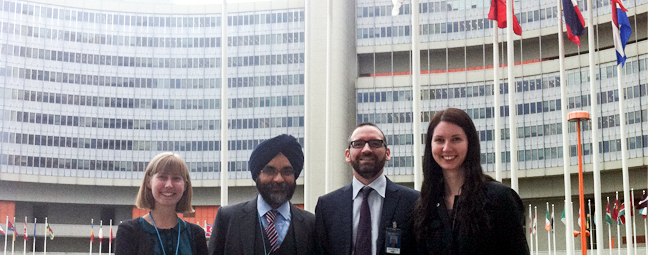 Although most of the time I’m allocated to the Department of Health and related bodies’ audits, there are opportunities to be involved in audits for our international clients. The past few weeks I’ve been working on the UNODC (United Nations Office on Drugs and Crime), which is based in Vienna, Austria. The UN (United Nations) is a fascinating client to work on, due to the wide range of activities it undertakes and its funding structure (some fixed funding or “regular budget” and some voluntary contributions). There are also some quite nice audit locations such as New York, Geneva and Copenhagen that follows such work!
Although most of the time I’m allocated to the Department of Health and related bodies’ audits, there are opportunities to be involved in audits for our international clients. The past few weeks I’ve been working on the UNODC (United Nations Office on Drugs and Crime), which is based in Vienna, Austria. The UN (United Nations) is a fascinating client to work on, due to the wide range of activities it undertakes and its funding structure (some fixed funding or “regular budget” and some voluntary contributions). There are also some quite nice audit locations such as New York, Geneva and Copenhagen that follows such work! Our role of auditor is unique for the UN bodies, especially in comparison to most other public sector audits. We work on the Board of Auditors with other supreme audit institutions in the audit of the UN bodies (currently China and Tanzania). Every two years one of the countries rotates off the Board of Auditors, and another member country takes its place as auditor. For the UK, we have two years remaining meaning the opportunities within the NAO are also time limited. For me, this was something I wanted to work on since I started here, so when the opportunity arose I couldn’t say no!
The UN is also different to our normal audit clients in the format and timing of their accounts (every two years or biennia). Even the accounting standards are different! However, the UN as a whole is in the process of changing their accounting standard from UNSAS (United Nations System Accounting Standards) to IPSAS (International Public Sector Accounting Standards). For UNODC this is the last year of UNSAS accounts, meaning we have more work to do on the opening balances for next year. Although this means more work, it will hopefully mean that their accounts are more comparable to other public sector accounts and are more useful to users such as member states.
The majority of the work that the UNODC is involved in can be quite “interesting” too – such as working with farmers in Colombia to prevent them growing coca, or counter piracy activities in East Africa (dealing with attacks by Somali pirates). This means that we’ve had the opportunity to go on field office visits to far flung locations such as Uzbekistan and Brazil this biennium.
Being away so far has been fun; I’ve had the opportunity to work with more of my colleagues from the London office and to spend time in Austria. We stayed in a place quite central in Vienna called Stephansplatz, meaning there were lots of eateries and shops nearby. I would also add that it’s not all fun – we have deadlines to adhere to and a lot of time travelling between countries!
